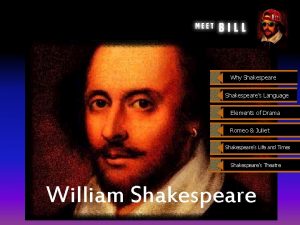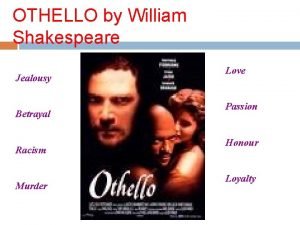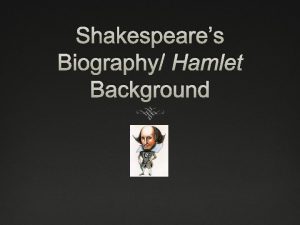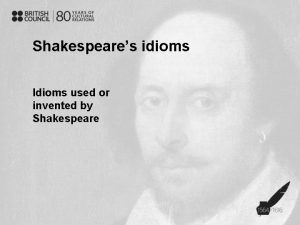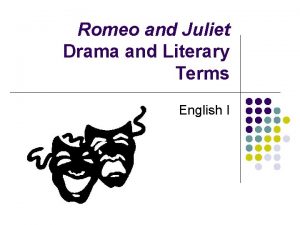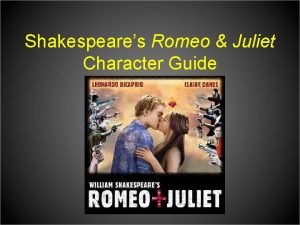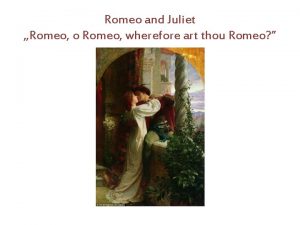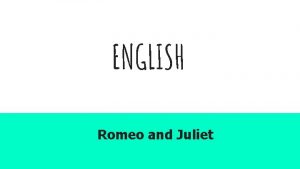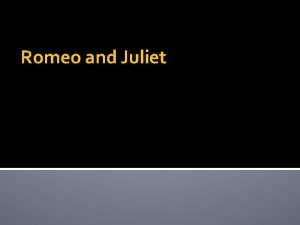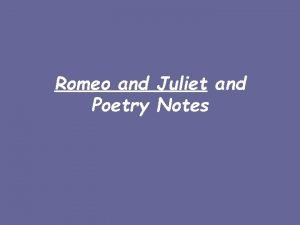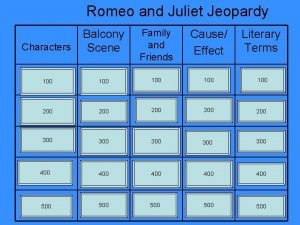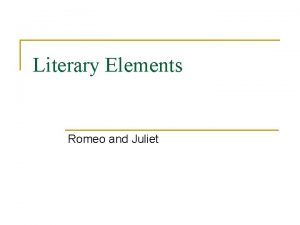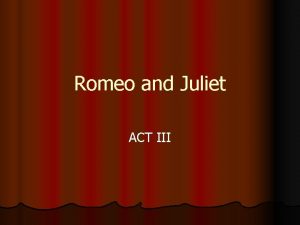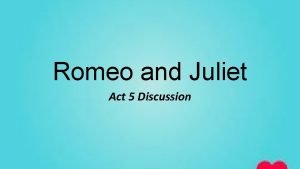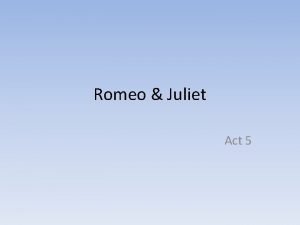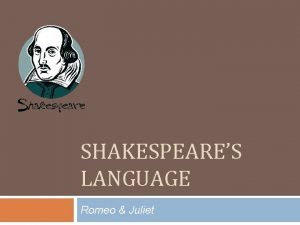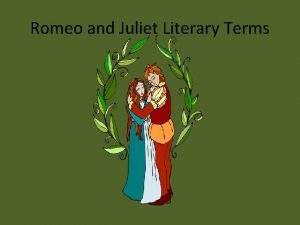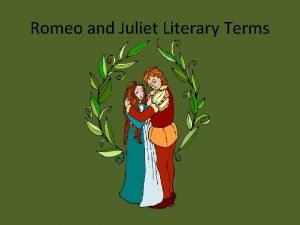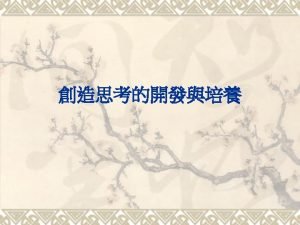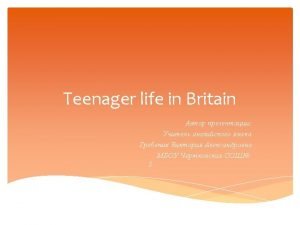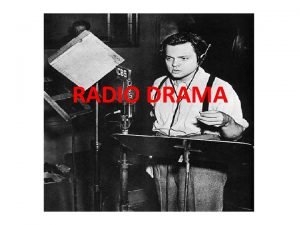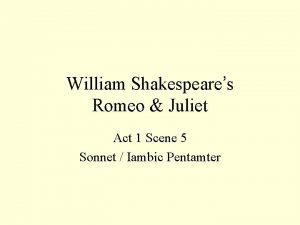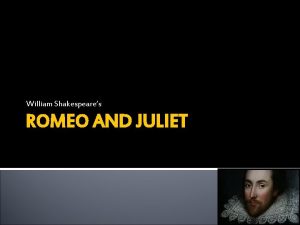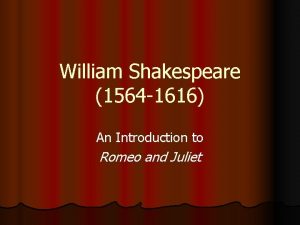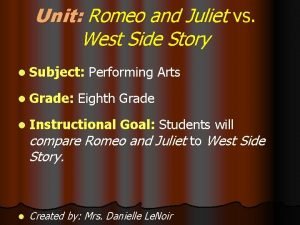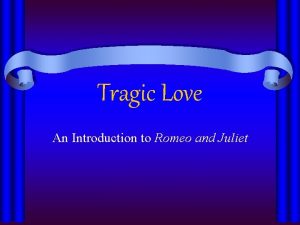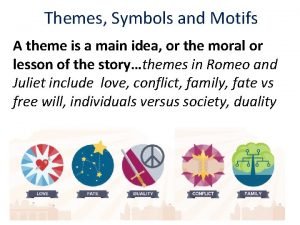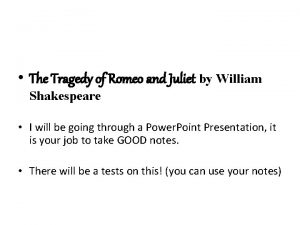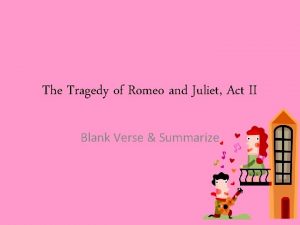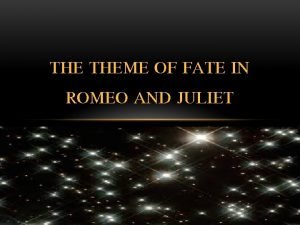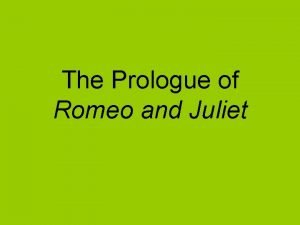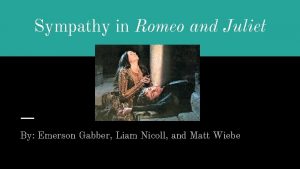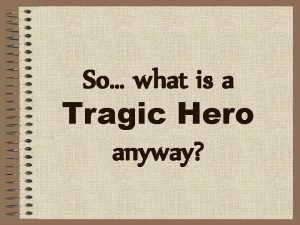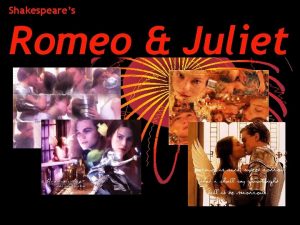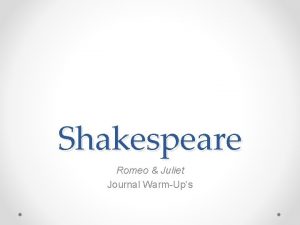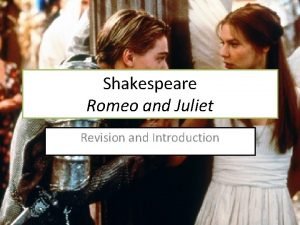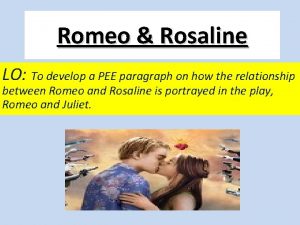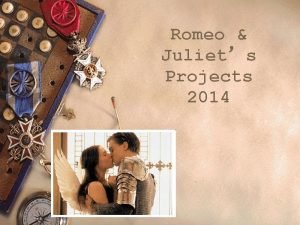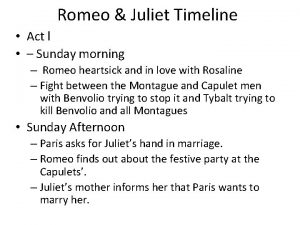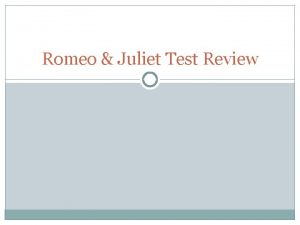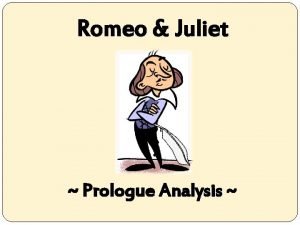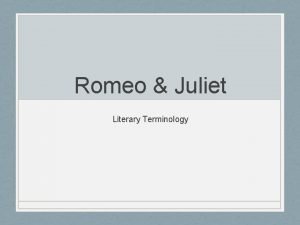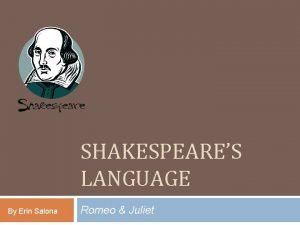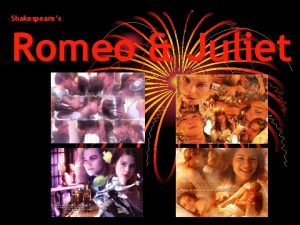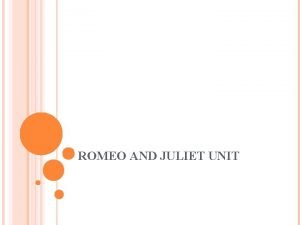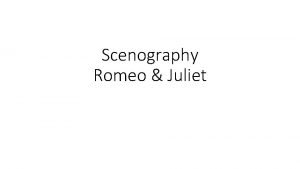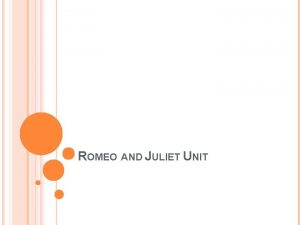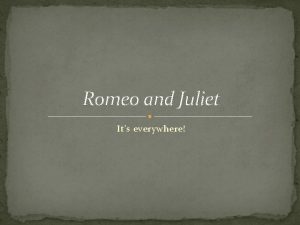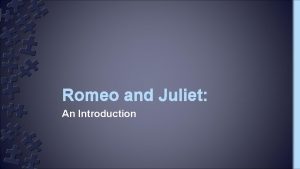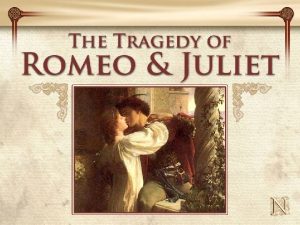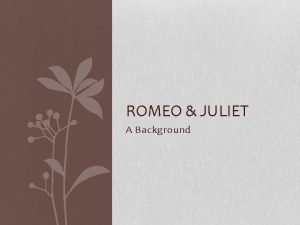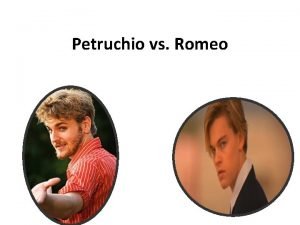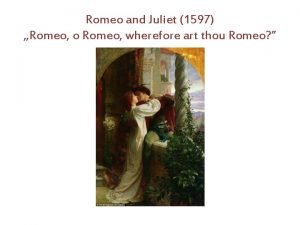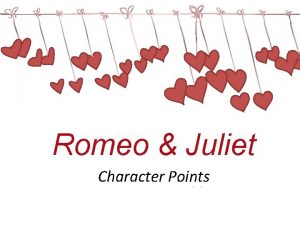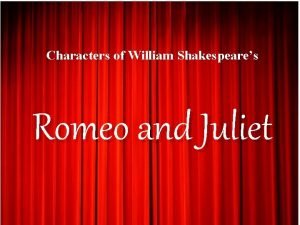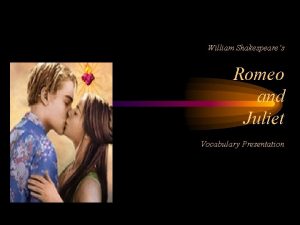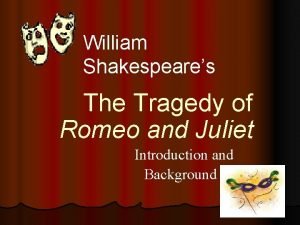Why Shakespeares Language Elements of Drama Romeo Juliet





























































- Slides: 61

Why Shakespeare’s Language Elements of Drama Romeo & Juliet Shakespeare’s Life and Times Shakespeare’s Theatre William Shakespeare

Why Shakespeare? n For 400 years, Shakespeare has been considered the greatest dramatist and poet in the English-speaking world. n His plays are produced thousands of times each year in theaters all over the world, and audiences today are enthralled as the ones who first attended them in London.

Why Shakespeare? Shakespeare was a master of our complex English language, and he filled his plays with poetry and prose in a way unequaled by any other writer.

Why Shakespeare? He wrote with an incredible vocabulary of 17, 000 to 29, 000 words (variously disputed, ) which is astounding when one considers that the King James Version of the Bible uses slightly over 3, 000. Many of those words are used in sophisticated puns and wordplay yet he wrote for the commoner as well as the educated. The language of Shakespeare is rich beyond that of any other writer.

The Characters The characters in Shakespeare’s plays are complete in all varieties of human experience. Some are silly people who do not know they are silly. A few of them are monsters. Some are truly tragic people: good but with flaws in character which lead them to destruction. http: //quicksilvermint. com/medallions/pages/comedy-tragedy. htm

Some are lovers embracing life with a passion, and others are losers who spend their lives in anger and hate. They represent all the varieties of personality, motivation, and character which exist in humankind.

Shakespeare’s Language • I hear students say, “It’s so hard to read this Old English!” • Shakespeare did not write in Old English (nor did Twain in Huck Finn or W. H. D. Rouse when he translated The Odyssey)

This is what Old English looks like…

Shakespeare’s Language • Shakespeare wrote in Early Modern English • Early Modern English is only one generation of language away from the English you speak today!

• Shakespeare only had an 8 th grade education • There were no dictionaries • Shakespeare is credited by the Oxford English Dictionary with the introduction of nearly 3, 000 words into the language • His vocabulary numbers upwards of 17, 000 (quadruple that of an average, educated conversationalist)

Words from Shakespeare The English language owes a great debt to Shakespeare. He invented many of our common words by changing nouns into verbs, changing verbs into adjectives, connecting words never before used together, adding prefixes and suffixes, and devising words wholly original. academe accused addiction advertising amazement arouse assassination backing bandit bedroom beached besmirch birthplace blanket bloodstained barefaced blushing bet bump buzzer caked cater champion circumstantial cold-blooded compromise courtship countless critic dauntless dawn deafening discontent dishearten drugged dwindle epileptic equivocal elbow excitement

exposure eyeball fashionable fixture flawed frugal generous gloomy gossip green-eyed gust hint hobnob hurried impede impartial invulnerable jaded label lackluster laughable lonely lower luggage lustrous madcap majestic marketable metamorphose mimic monumental moonbeam mountaineer negotiate noiseless obscene obsequiously ode Olympian outbreak panders pedant premeditated puking radiance rant remorseless savagery scuffle secure skim milk submerge summit swagger torture tranquil undress unreal varied vaulting worthless zany Source: http: //shakespeare. about. com/library/weekly/aa 042400 a. htm

Phrases Coined by Shakespeare • As good luck would have it • Break the ice • Eaten me out of house and home • Elbow room • Fool’s Paradise • For goodness’ sake • Full circle • • Good riddance It was Greek to me Heart of gold In a pickle Kill with kindness Lie low Love is blind Not slept one wink

Shakespeare’s English • In the England of Shakespeare’s time, English was a lot more flexible as a language • The most common simple sentence in modern English follows a familiar pattern: Subject (S), Verb (V), Object (O). (Will caught the ball. ) • However, Shakespeare was much more at liberty to switch these basic components • Shakespeare used a great deal of SOV inversion (Will the ball caught. )

• Switching the S-V-O order to S-O-V made it easier for Shakespeare to rhyme and to manipulate his words to flow easily in poems and plays. • Shakespeare could effectively place the metrical stress wherever he needed it most by switching word order • Shakespeare also used O-S-V construction (The ball Will caught) for the same reasons.

Inverted Word Order Lady Montague: Oh, where is Romeo? Saw you him today? Right glad I am he was not at this fray. Translation: Oh, where is Romeo? Did you see him today? I am very glad he was not in this fight.

Elements of Drama Tragedy: A drama that ends in catastrophe—most often death—for the main character and often for several other important characters as well Tragic Hero: The main character, someone who is nobly born and has great influence in his or her society. This character has weakness or errors in judgment (Tragic Flaws) that lead to his or her downfall. Fate may play a role in the course that events take. Foil: A character whose personality or attitudes are in sharp contrast to those of another character in the same work. This highlights the other character’s traits

Elements of Drama Comic Relief: A humorous scene, incident, or speech that relieves the overall emotional intensity in the play. Comic relief helps the audience absorb the tragic events in the plot of a play. Allusion: A brief reference, within a work, to something outside the work that the reader or audience is expected to know. Many of Shakespeare’s allusions are to mythology or the Bible.

Elements of Drama Soliloquy: A Soliloquy is a speech made by an actor alone on stage to let the audience know what is on that character’s mind. Aside: An Aside is a character’s remark to the audience or to another character that others on stage aren’t supposed to hear. The purpose of an aside is to reveal that character’s thoughts. Monologue:

Romeo and Juliet The exact year in which William Shakespeare wrote Romeo and Juliet is unknown, but it is definitely one of his earlier works, and one of only two tragedies written in the period from 1590 to 1595. Home

Romeo and Juliet is as much about hate as love n Although it is considered one of the world’s greatest love stories, it can be argued that the love story is only a vehicle for the resolution of the story about hate, that is, the feud between the two families. Home

Romeo and Juliet The plot was based on a fourteenth-century Italian short story, or novella, written by Matteo Bandello, that included elements of history, tradition, romance, and fable. Home

Romeo and Juliet Themes are the fundamental and often universal ideas explored in a literary work. 1. The Forcefulness of Love 2. The Individual Versus Society 3. The Inevitability of Fate Home

Romeo and Juliet The Forcefulness of Love n The most famous love story in the English literary tradition. n Focus on romantic love n Love as overpowering force: ● Family ● Friends Home

Romeo and Juliet Love as a cause of violence. . . Hate, Violence, Death, Love is blinding. . . Home

Romeo and Juliet The Individual Versus Society Romeo and Juliet against. . . n n Family Law Religion Honor Home

Romeo and Juliet The Inevitability of Fate n Straight path or a series of crossed roads? n “Star-crossed Lovers” n Feuding families n Series of unfortunate events n Bad timing Home

Romeo and Juliet Motifs are recurring structures, contrasts, or literary devices that can help to develop and inform the text’s major themes. 1. Imagery: Light and dark • Night/Day Night = Good or Evil Day = Evil or Good • Provides contrast, hints at alternatives 2. Opposing points of view • Mercutio’s POV • Servants’ POV Nurse Peter Musicians Home

Romeo and Juliet Symbols are objects, characters, figures, or colors used to represent abstract ideas or concepts. 1. Poison • “Virtue itself turns vice, being misapplied, /And vice, sometimes by action dignified. ” • Tendency to “poison” things 2. Thumb-Biting • Insulting, juvenile gesture; vulgar display • Represents the foolishness of entire Montague/Capulet feud • Denotes the stupidity of violence in general Home

Romeo and Juliet 3. Queen Mab • • • Brings dreams; confirms the vices of greed, lust, violence. Is total nonsense; fairy pulled by “grey-coated gnat” Tiny, Insubstantial; just like the dreams/desires/fantasies of people Home

Romeo and Juliet Home

Shakespeare’s Life and Times BIRTH William Shakespeare was born into a reasonably well-to-do family. It was custom to baptize a child three days after birth, and since church records at Holy Trinity Church in Stratford show his baptism to have been April 26, 1564, he is assumed to have been born April 23, 1564. The only records kept of births, marriages, and deaths were those kept by the Church. He is believed to have attended in the half-timbered building which still stands in Stratford and some think he taught there for a short time, as well

FATHER His father, John Shakespeare, was an established businessman in Stratford. Upon-Avon who dealt in leather and glove making and who rose in town importance from being chamberlain and alderman to high-bailiff, much like being a mayor today. MOTHER Mary Shakespeare, his mother, was the daughter of Robert Arden, a prosperous gentleman-farmer.

http: //www. onlineshakespeare. com/earlyyears. htm

EDUCATION n. Shakespeare attended the Stratford Grammar School. n. He did not attend Oxford or Cambridge, as is often assumed. MARRIAGE He married Anne Hathaway when he was 18 and she was 26. They became the parents of three children—Susanna (born in 1583), and two years later, twins Judith and Hamnet.

Anne Hathaway’s Cottage

Tragedy struck Shakespeare when Hamnet died in 1596 at age 11. Susanna was married to John Hall, and they had a daughter, Elizabeth married twice but had no children Judith married and had three sons None of Judith’s sons produced an heir So, when Elizabeth died in 1670, Shakespeare ‘s direct bloodline came to an end No one today can claim direct, blood relationship to William Shakespeare

http: //www. onlineshakespeare. com/familytree. htm

Upstart Crow No one knows for sure what Shakespeare did from 1585 to 1592 he was being mentioned as an “upstart crow” by a jealous rival dramatist in London. By 1592, he was an actor and playwright. His first three plays were Henry VI, Titus Andronicus, and The Comedy of Errors.

Theaters of London The theaters of London were closed between the years of 1592 and 1594 because of the bubonic plague, and during this time Shakespeare wrote his poem “Venus and Adonis” and began writing sonnets.

Lord Chamberlain’s Men In 1594 the plague was over, and Shakespeare helped form the Lord Chamberlain’s Men which became London’s premier acting company in which he was both actor and playwright.

Queen Elizabeth n He and his company acted before Queen Elizabeth in 1594. n Queen Elizabeth placed the company under her protection.

The Puritans This protection was very important because a religious group called the Puritans were trying to shut down theaters for being sinful and attracting the wrong sorts of people. The queen loved theater and the arts, so Shakespeare’s company was able to enjoy 14 productive years until her death in 1603.

King James I At that time, King James I continued royal patronage, and thereafter, the company was known as The King’s Men. http: //www. luminarium. org/sevenlit/james/

Shakespeare’s Plays and Poetry Shakespeare’s plays and poetry were very popular and from the beginning of his writings until his death in 1616 he wrote 37 plays, 154 sonnets, and other poetry. Sonnet: a fourteen line poem with a fixed rhyme scheme and iambic pentameter that ends with a rhyming couplet Around 1610 he left London for good and retired to his home in Stratford where he became an important member of the local gentry. In 1613 he collaborated with John Fletcher on Henry VIII, The Noble Kinsmen, and a play, which has since become lost, named Cardenia.

He died on April 23 rd in 1616. Shakespeare wrote his own epitaph, a curse, which has proven highly effective, as no one has moved his remains.

Shakespeare’s Theater Attending theater in Shakespeare’s time was very different from attending it now, and Shakespeare’s theater, the Globe, was unlike any modern one. It was probably round, or nearly so, and the roof covered only the outside galleries; thus, many who went to see the plays got wet in the frequent London rains. The stage jutted out into the audience and the actors were surrounded on three sides by people who paid to see the performance.

Shakespeare’s Theater


Shakespeare’s Theater No one went to theater at night. There were no electric stage lights, and the stage was in the middle of the audience, lighted by the sun. There was no scenery and very few props. There were no costumes except for any which the actors acquired for themselves, so there might be all manner of styles and periods of dress on the stage at one time.

Shakespeare’s Theater The Stage n 1/3 of yard was filled with 6 ft high platform n no curtain n no artificial lighting n back wall had at least two doors n balcony was used for hilltops, walls of cities, or second story scenes. n trapdoors were used to raise or lower actors and props.

Inside The Globe Theatre

Attending Shakespeare’s Theater Spectators’ price of admissions was n One penny - to stand in yard around stage (these were called the groundlings) n Two pennies - to sit in 2 nd and 3 rd floor galleries n Three pennies - to sit in the first floor galleries Nearly half theater-goers stood on the ground around the stage; they were called “groundlings, ” and they were a rowdy bunch, eating, talking and yelling out anything which took their fancy at the moment. People paying higher prices got seats in the galleries for their money and a roof to keep off the rain.

Inside The Globe Theatre

Attending Shakespeare’s Theater The Groundlings

The Galleries

The Galleries http: //www. greatbuildings. com/cgi-bin/gbi. cgi/Globe_Theater. html/cid_1034646035_The_Globe_Theatre_interior. gbi

Attending Shakespeare’s Theater Today no courteous theater-goer would think of walking around while a play was on, but Shakespeare’s audiences, especially the groundlings, made no pretense of courtesy, and the playwright who, after all, had been an actor himself, knew he had better write a play filled with action and good stories or he would soon lose the attention of his audience. Shakespeare’s plays are action-packed with all sorts of sword play and buffoonery.

Attending Shakespeare’s Theater In Shakespeare’s time no women or girls acted in plays, which is probably the main reason there are many more men’s than women’s parts in his plays. For a woman to act in a play would have been a shameless and serious breach of social custom. Women were played by men, and girls and young women were played by young men or boys who were carefully taught by the older actors. Only later in the 17 th century did women and girls act, and even then an actress was considered somewhat daring and her character a little suspect.

http: //www. greatbuildings. com/cgi-bin/gbi. cgi/Globe_Theater. html/cid_globe_the_km_003. gbi

In 1613 the old Globe Theater burned to the ground after being set on fire by a spark from a cannon during a performance of Henry VIII.
 Minor characters in romeo and juliet
Minor characters in romeo and juliet Romeo and juliet
Romeo and juliet Romeo and juliet scripts
Romeo and juliet scripts Theme statement about jealousy
Theme statement about jealousy Shakespeares tragedy about racism and jealousy
Shakespeares tragedy about racism and jealousy William shakespeare 1587
William shakespeare 1587 Themes of hamlet
Themes of hamlet Idioms invented by shakespeare
Idioms invented by shakespeare Pictures
Pictures Long uninterrupted speech
Long uninterrupted speech Mercutio character traits
Mercutio character traits Romeo and juliet o romeo
Romeo and juliet o romeo Key quotes in romeo and juliet
Key quotes in romeo and juliet Romeo oh romeo where art thou romeo meaning
Romeo oh romeo where art thou romeo meaning Romeo and juliet couplet
Romeo and juliet couplet Where art thou romeo meaning
Where art thou romeo meaning Juliet on jeopardy
Juliet on jeopardy Romeo and juliet literary devices
Romeo and juliet literary devices Romeo and juliet literary terms
Romeo and juliet literary terms Literary elements of romeo and juliet
Literary elements of romeo and juliet Why is romeo and juliet a tragedy
Why is romeo and juliet a tragedy Lady capulet goes to tell juliet about the plans
Lady capulet goes to tell juliet about the plans Why does juliet kiss romeo’s lips?
Why does juliet kiss romeo’s lips? Balthasar quotes romeo and juliet
Balthasar quotes romeo and juliet Chiasmus in romeo and juliet
Chiasmus in romeo and juliet Shakespeare language words
Shakespeare language words Simile in romeo and juliet
Simile in romeo and juliet Language devices in romeo and juliet
Language devices in romeo and juliet Metaphors in romeo and juliet
Metaphors in romeo and juliet Simile in romeo and juliet act 1
Simile in romeo and juliet act 1 Dont ask why why why
Dont ask why why why Dramaserial.tv semi
Dramaserial.tv semi Drama türleri
Drama türleri Famous radio plays
Famous radio plays Drama berasal dari bahasa yunani adalah
Drama berasal dari bahasa yunani adalah Similes in romeo and juliet act 1, scene 5
Similes in romeo and juliet act 1, scene 5 Purple fountains romeo and juliet
Purple fountains romeo and juliet Romeo and juliet sonnet
Romeo and juliet sonnet Romeo and juliet sonnet
Romeo and juliet sonnet Was romeo and juliet a true story
Was romeo and juliet a true story Site:slidetodoc.com
Site:slidetodoc.com West side story romeo and juliet worksheet
West side story romeo and juliet worksheet Introduction in romeo and juliet
Introduction in romeo and juliet Thou knowest the mask of night is on my face
Thou knowest the mask of night is on my face Revenge in romeo and juliet
Revenge in romeo and juliet Poem for romeo and juliet
Poem for romeo and juliet The tragedy of romeo and juliet
The tragedy of romeo and juliet The tragedy of romeo and juliet by william shakespeare
The tragedy of romeo and juliet by william shakespeare The tragedy of romeo and juliet act 2
The tragedy of romeo and juliet act 2 Famous lines from romeo and juliet
Famous lines from romeo and juliet Act 1 prologue romeo and juliet
Act 1 prologue romeo and juliet Thesis romeo and juliet
Thesis romeo and juliet Tragic character
Tragic character Facts on romeo and juliet
Facts on romeo and juliet Romeo and juliet knock knock jokes
Romeo and juliet knock knock jokes Romeo and juliet historical context
Romeo and juliet historical context Romeo and juliet pee paragraphs
Romeo and juliet pee paragraphs Romeo and juliet diorama
Romeo and juliet diorama Romeo and juliet act 2 timeline
Romeo and juliet act 2 timeline Comic relief romeo and juliet
Comic relief romeo and juliet Prologue romeo and juliet audio
Prologue romeo and juliet audio Juxtaposition literary device
Juxtaposition literary device

